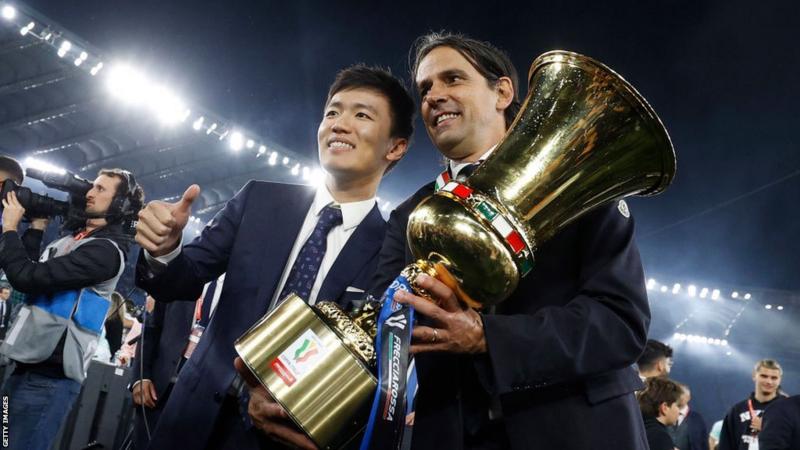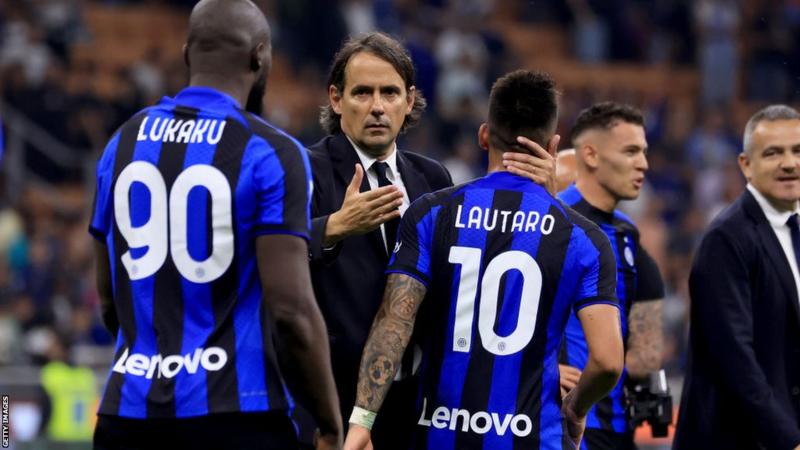“The phone rang,” recounted Giancarlo Inzaghi, father of Inter Milan boss Simone. “It was Romelu Lukaku.”
“My son tried to convince him,” Inzaghi Sr told Gazzetta dello Sport. “‘Here, you are the king. It will be different in London.’”
It was too late. The Belgium striker had decided he was going back to Chelsea, much to coach Inzaghi’s disappointment.
“It was like losing three players in one fell swoop,” he moaned to his father following Lukaku’s move in 2021, only three months after Inzaghi joined Inter.
Inzaghi arrived with hopes of continuing the marvellous work of predecessor Antonio Conte. The aim was to win back-to-back titles but, with big-name departures, including Lukaku, Inter missed out on the Scudetto.
Fast forward to April this year and, rather than challenging at the top of the table after their star striker returned on loan, Inter were sixth.
Three consecutive defeats and a draw at lowly Salernitana had elevated the pressure and Inzaghi seemed exasperated by Lukaku’s profligacy.
By the beginning of April, Lukaku had scored only three league goals, two of which were from the penalty spot. Rumours emanated from every crevice of every tabloid. The striker and Inzaghi don’t see eye to eye. Apparently. Inzaghi was on the brink. Allegedly. Inter were in crisis. Definitely.
Monza were next, a newly promoted team and yet another loss for Inter. Their 11th defeat of the season. The vultures were circling. In life we are taught that nice guys finish last, but that is especially true in football in Italy. Inzaghi was accused of being just that – a nice guy, a company man.
Yet, as Inter now prepare for Saturday’s Champions League final against Manchester City, that was one of the many reasons he was picked for the role.
Marotta the architect
When CEO Beppe Marotta arrived in December 2018, he was tasked with returning Inter to former heights. Forced to sit back and watch Juventus dominate for nine years, Inter yearned to break their hegemony and become a force in Europe once again.
Marotta was the architect behind Juventus’ dominating success. Alongside right-hand man and protege Fabio Paratici, he developed a long-term project that yielded an immense amount of joy and trophies.
So when Juventus decided not to offer their star director a new contract in August 2018, choosing to count on Paratici instead, Marotta moved on to the competition.
At Inter, he found a home and a club in need of his expertise. Alongside their other directors, Marotta formulated a winning project aimed at restoring glory and it started in the dressing room.
A healthy and happy atmosphere breeds success, and Marotta’s first priority was to remove all toxicity, even if it meant sacrificing great talent. Certain players left and were replaced by those willing to grow, to listen and to adapt.
Next was the development of a winning mentality. Inter is a notoriously inconsistent club where the highs are high but the lows can be depressingly low. They are called ‘Pazza’ (crazy) Inter for a reason.
They needed a manager who could discipline and inspire winning consistency. In came Conte, the mentality monster. Scudetto achieved, Juventus’ hegemony broken. Check.
Europe was the next dream and, when Conte left, Marotta had different requirements of his successor.
He sought peace and stability at the top, a dependable figure who wanted the job for the long term and would thrive despite the financial limitations of the club. Someone who could establish a great rapport with the players, elevate the style of play and succeed in Europe to bring in the big money.

Enter Inzaghi – the ‘normal one’
Marotta had followed Inzaghi for some time. After all, he was Paratici’s childhood best friend. Familiar with his character and burgeoning talent, Marotta watched Inzaghi build and win with Lazio despite the hardships suffered at that club. He was to be Conte’s successor but was he the right character?
As we have grown to understand, Inter do their best work when presided over by maniacal characters willing to kill for the win – the Jose Mourinhos or Contes of this world – men who always had something to prove.
Inzaghi was the normal one. He lacked the flair for theatrics. He would complain a lot and he can be rather annoying on the sidelines, but his bark is always worse than his bite.
Losing to Spezia in March despite boasting 70% possession and taking 28 shots left critics bewildered. Forget the title; forget even challenging. The Nerazzurri were no longer defined by their winning mentality but by their lack of ruthlessness and the endless squabbles on the pitch.
The team reflected their leader’s personality and Inzaghi’s job had to be on the line.
Endless headlines noting potential successors made the rounds on the front pages of the sports newspapers, yet Inzaghi never wilted under the pressure. If anything, the most difficult moments seemed to strengthen his focus.
According to his assistant coach, Massimiliano Farris, the loss to Bayern Munich in the group stage of the Champions League was followed by a dinner in which Inzaghi insisted they could do it – they could overcome Barcelona and power forward in Europe. They did.
The draw against Salernitana in April gave the coach the same sensation. With their backs against the wall, Inzaghi flipped the script. He wasn’t going to fight; that only provoked fear. It was time to lighten the mental load, to lower the intensity in training and to get back to enjoying football.
Inter began winning again. They bulldozed Lazio, who under Maurizio Sarri finished the season in second place. Rarely have we seen a Sarri side cowering deep in their own half as they tried to contain a savagely hungry Inter. That win came just after Inter comprehensively defeated Empoli a week before.
The greater emphasis on individualised training and the lowering of intensity in group training was getting the best out of Lukaku and Lautaro Martinez and they have since become unstoppable.

In his past 11 matches, Lukaku has scored seven times and delivered five assists. Martinez has scored 10 in his past 12 matches.
Inter were not only winning but enjoying their football. The squabbling that threatened their season was replaced with healthy banter and a lot of laughter.
Inzaghi instructed them to think of nothing but of how they could help their team-mate. No complaining, no gesturing on the pitch – “we do this together”, as a team, as the family they had become.
When the Nerazzurri believe in themselves, they are Italy’s indomitable presence. They can overwhelm you into oblivion with their technique and athleticism by attacking in waves, or they can sit deep, hand over possession and counter-attack swiftly.
They can switch out their strikers and their wing backs while the bench-warmers can be even more menacing. They can be direct or pass around you and they are combative and dirty when they want to be.
Inzaghi studies opponents endlessly to concoct the perfect gameplan. He responds to his critics where it matters – on the pitch.
Juventus manager Massimiliano Allegri walked away whispering criticisms of Inter after being knocked out of the Coppa Italia. Inter have won every match but one since, securing their second trophy of the season and now fighting for a third.
They may never possess the quality of Manchester City, but they are a side who deserve their place in the final.
They were built to fight at the top once again and they have proved they rather enjoy the pressure and can thrill in the big moments.
Inzaghi has only ever lost one final, his first. Since then, he has won seven. A man for the big occasion, can he do it again?





